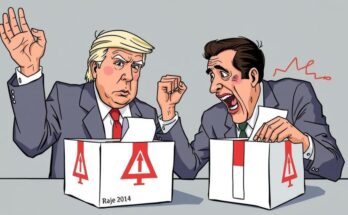Tunisia’s upcoming presidential election on 6 October exhibits a stark contrast to previous elections, marked by repression and an absence of democratic engagement. President Kais Saied’s regime has dismantled the democratic institutions that facilitated his rise, employing authoritarian measures to silence opposition. The electoral process is fundamentally flawed, with allegations of unfair practices and absence of independent oversight. Despite this, popular discontent and protests signal a potential mobilization against Saied’s rule, emphasizing the resilience of the democratic aspirations kindled during the Tunisian revolution.
As Tunisia approaches its presidential election scheduled for Sunday, 6 October, the atmosphere that once characterized previous electoral seasons has drastically changed. In contrast to the vibrant rallies and spirited debates that dominated the political landscape from 2011 to 2019, there is a palpable sense of unease and absence of meaningful civic engagement in the current pre-election environment. President Kais Saied, who came to prominence following significant democratic uprisings, has significantly altered Tunisia’s political landscape since his coup on 25 July 2021 and has systematically undermined the very democratic processes that initially brought him to power. This irony does not escape the consciousness of Tunisians as they witness the disappearance of the democratic framework. Saied’s tenure has been marked by increasing authoritarianism; his government has silenced dissenting voices, imprisoned political opponents—including prominent figures such as Rached Ghannouchi—and stifled the media, effectively curtailing public discourse. The recent pre-election period has also seen a marked reduction in both the visibility and viability of opposition candidates. Through a series of legal and procedural maneuvers, Saied has kept dissent at bay, including the detainment of the leading opposition candidate, Ayachi Zammel, who now symbolizes the resistance against Saied’s dominance even while imprisoned. The fear surrounding this election is palpable. The ruling regime has escalated its crackdown on dissent, evidenced by the increased frequency of arbitrary arrests and the muzzling of civil society organizations. Despite the atmosphere of intimidation, however, some Tunisians have expressed a willingness to compete against Saied, albeit under oppressive conditions that involve rigorous requirements for candidacy and considerable risk of retaliatory actions from the state. The recent legislative changes added to Saied’s grip on power further illustrate a systematic dismantling of democratic norms. As opposition candidates struggle for their rightful place in the electoral process, the electoral commission has disqualified numerous individuals, thereby rendering the election neither fair nor credible. Saied’s regime not only undermines public trust but also curtails important democratic mechanisms that allow for accountability. Recent protests, although sporadic, indicate a growing discontent against Saied’s authoritarian practices and an emerging coalition of diverse opposition voices. Moreover, the legislative environment increasingly limits the ability of civil society to participate in oversight roles within the electoral process, evidenced by the refusal to accredit established monitoring organizations citing unfounded allegations. Despite these challenging circumstances, the potential for popular mobilization against Saied’s rule is significant. Many see voting as a critical means to express discontent and a last chance to alter Tunisia’s political trajectory. The mobilization speaks to a broader recognition that Saied’s project essentially opposes the aspirations of the Tunisian revolution, requiring a collective effort to restore a functional democracy.
The current political climate in Tunisia is steeped in authoritarianism following President Kais Saied’s coup in July 2021, which dismantled the democratic institutions that were established after the 2011 uprising. Saied’s government has systematically undermined the democratic process, utilizing legal and extra-legal means to silence opposition and discredit electoral competition. The contrast between past elections, which were marked by robust public involvement and democratic norms, and the current election reflects a significant regression in Tunisia’s political evolution. The repression of dissent has elicited widespread criticism and a growing impetus for opposition mobilization, underlining the critical and tense climate leading up to the election despite the looming threat of state repression.
In conclusion, the upcoming presidential elections in Tunisia reflect a troubling erosion of democratic principles under Kais Saied’s rule. As the electoral process is marred by intimidation, exclusion, and the manipulation of laws, the hope for a meaningful democratic revival rests on the ability of citizens to mobilize against Saied’s burgeoning authoritarianism. This precarious moment serves as both a reminder of Tunisia’s revolutionary aspirations and a call to action for those committed to restoring a genuine democratic framework that respects the will of the people. The increasing opposition, while currently under threat, suggests that the spirit of resistance remains alive despite the oppressive political climate.
Original Source: www.middleeasteye.net




